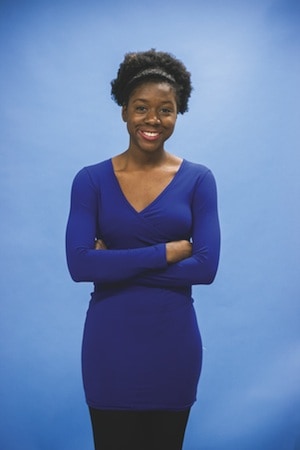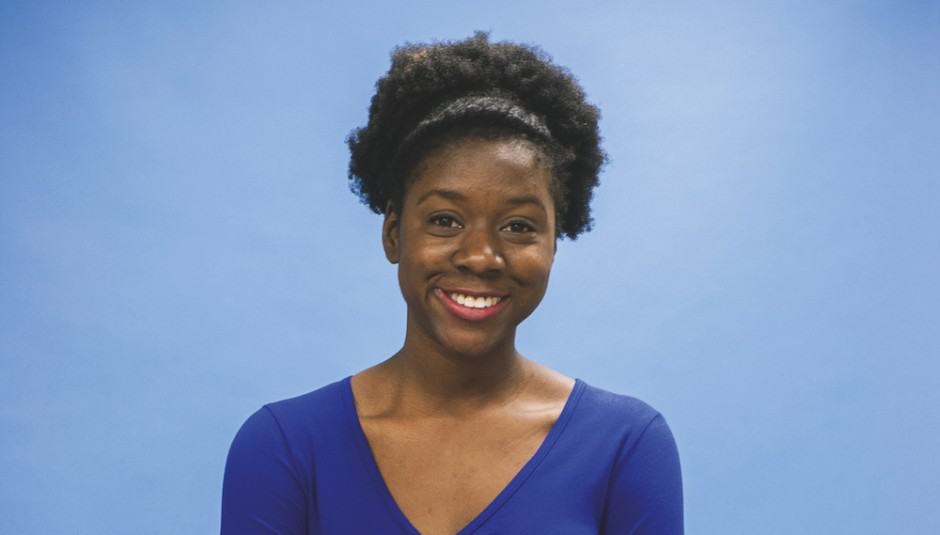As of this Friday, Yolen Bollo-Kamara is the new president of the University of Toronto Students’ Union (UTSU) for the 2014–2015 academic year. Bollo-Kamara served as vice-president, equity this year, and ran with team U of T Voice for the presidency. The Varsity sat down with her to discuss her hopes and plans for the upcoming year, and to get her opinion on the controversial proceedings of this year’s elections.

JENNIFER SU/THE VARSITY
The Varsity: So, what are you most excited to do, now that the results are ratified and we’re moving towards your actual term?
Yolen Bollo-Kamara: A few things. I guess I’m really excited to bring the board together. Although there were two different teams and some independents running, I think at the end of the day we all want to do what’s in the best interest of students. So I’m looking forward to working together [to] accomplish our mutual goals for the upcoming year.
TV: Can you talk to me about some of those things?
YBK: So one of the things was that we’d talked about pushing for a fall reading week. Scarborough has one, and we just found out that UTM’s currently looking into it. So I’m really looking forward to bringing that up here and seeing if it’s something we can do.
TV: So what would that look like? Lobbying the administration?
YBK: There are a lot of options available, like having the school term start a week earlier — which, from talking to students, I think most would be in favour of.
Another thing that we spoke about was the upcoming provincial and municipal elections. It’s looking like there will be a provincial election in the spring/early summer, so one of the big things is making sure that students know about what all the issues are.
Just two days ago, Newfoundland announced that they’re essentially eliminating student loans and continuing the freeze on tuition fees, which is amazing. So we’d really like to see our own provincial government look to address the growing debt and tuition fees that we have in Ontario as well.
TV: So how would you practically go about doing that?
YBK: I think one thing is going out and talking to students — ‘what would you like to see, are you aware that this happened in Newfoundland, that these are very real possibilities?’ We’re also looking to organize some debates on campus, and working with Elections Canada to make sure that students are able to vote on campus as well. Just trying to make the elections as visible and accessible to students as possible.
TV: How are you feeling about the changes to the structure of the executive this year? You’re going to be working with a lot of independent directors, and of course Pierre [Harfouche, vice-president-elect, university affairs] is part of the executive now. How do you think that is going to work?
YBK: Like I said, I think that people who choose to get involved in student politics tend to do it because they want to work for students. So I think people will find common ground in that sense. We’ve had our differences in the past, but I’m looking forward to sitting down with Pierre and the exec, including the new [vice-president] campus life, to figure out how we’ll be able to work together for next year.
TV: So, Pierre for a long time has been an advocate for defederation, and people have been making the assumption that those who voted for Pierre are in favour of defederation themselves. How would you approach those students, and try and work for them, if they do want to leave?
YBK: That’s a good question. I think that through participation in the summit, although we had our concerns and we had to leave, we heard what a lot of the concerns were from the college and faculty councils.
I think that it’s something that we’re going to have to continue to work to address. I think that students at U of T benefit from having a central students’ union, but we’ll have to figure out a way to balance the concerns of the students who use our services regularly and the concerns of those who are hoping to push for defederation.
I hope that our decision to leave the summit wasn’t taken as us not being willing to hear the concerns of students, or to work with the college and faculty councils. I’m very much committed to doing that, and so is the rest of my team.
TV: Speaking about the summit, having read the letter that you submitted, am I correct in saying the reasons you chose to leave were the administration’s involvement, and an unbalanced conversation?
YBK: I think that part of the reason that it wasn’t a balanced conversation was administration involvement. Because the administration determined who the faculty representatives should be, they determined the structure of the summit. They said that APUS and SCSU wouldn’t be able to participate, although I know that APUS requested to be able to at least submit written statements.
TV: I remember, at the executive forum, someone posed a question to you about the summit and your involvement with it. At the time, you guys were already conducting the survey of your members, so you already knew that you were planning to leave. Why did you choose not to bring it up at the debate?
YBK: I mean, I was sort of removed from the process because I was working on the election, but I knew that the survey was being carried out, but no results had been tabulated at that point. I expressed the concerns that we had with the summit, and that’s sort of where we were at that point.
But I think it was fairly common knowledge that the UTSU was thinking about leaving the summit, because, as The Varsity reported, at our last board meeting a lot of our board members had expressed concerns with the summit, and the conclusion that came out of that was that the UTSU would undertake a survey of our membership, to determine what our way forward should be.
TV: When it comes to the survey, there were several directors — Pierre [Harfouche] and Aimee [Quenneville] among them — that felt like they weren’t properly consulted, and that they didn’t like the way it was carried out. How would you respond to that?
YBK: I think that it’s important to note that the board directors gave direction to us to undertake the survey, and that’s what we did. If there are concerns about the survey, I welcome feedback. To some extent though, the discussion about the survey took time away from the actual issues. We were concerned about the summit from the beginning, and the fact that students weren’t being included, and think that that should be the focus of discussion.
TV: I was speaking to Bilal [Sandeela] afterwards, and he was saying that actual legal representation wasn’t consulted about the bylaws — he voted in favour of ratifying the results, but he did want there to be more of a discussion about the legal aspect of things. Do you feel that it’s not an issue?
YBK: Well, I’m not a lawyer; Sandy [Hudson], our executive director, does most of our legal work, and she didn’t seem to think it would be much of a problem. But if it does arise, I’m sure we’ll be able to defend ourselves, because we had to — well, the ERC had to — come up with a remedy to address the circumstance.
TV: What do you think about the vice-provost stepping in and giving her opinion?
YBK: Well, she didn’t really express an actual opinion, but I think it’s problematic either way. As I said before, I think it’s important for student unions to remain autonomous of the university administration, and I don’t think that it’s her place to have an opinion. We don’t report to the vice-provost.
Correction Monday March 31, 2014: A previous version of this article attributed a quote to Bollo-Kamara indicating that the ASSU wanted to participate in the student societies summit but was unable to. This is inaccurate, Bollo-Kamara said the SCSU wished to participate but was unable to.


